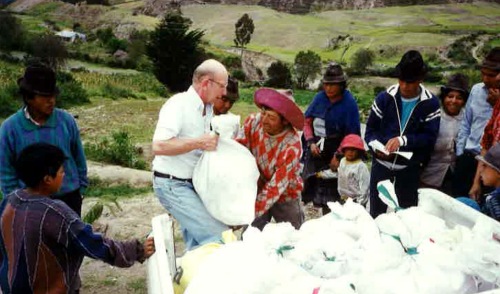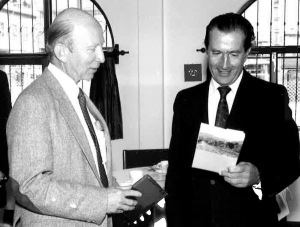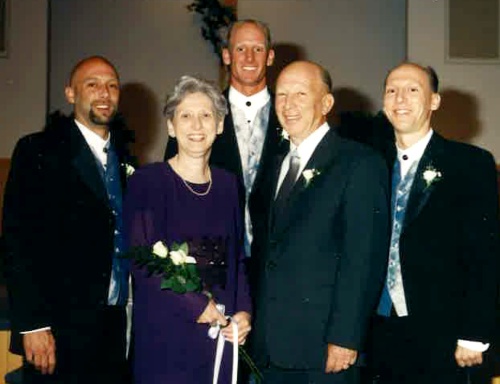Cinco leyes para destruir la economía familiar, y también para restaurarla
26 de abril de 2015 11:40
“Estamos a fin de mes y ya no tengo dinero” es una frase que se repite con frecuencia y puede llevar a las familias a estados de estrés, preocupación, infelicidad y, en casos extremos al sobreendeudamiento por la falta de una cultura financiera y de control en los gastos.
Cómo restaurar la economía familiar fue el tema que trató este sábado 25 de abril del 2015 en Quito el conferencista argentino Andrés Panasiuk en la Iglesia Evangélica de Iñaquito, en el norte de la capital.
Durante tres horas y frente a un auditorio de 530 personas, este comunicador y pastor evangélico de origen ucraniano contó cómo llega una familia a estar agobiada por las deudas y cuál es el camino para restaurar sus finanzas. El análisis de Panasiuk se basa en la parábola del Hijo Pródigo narrada en laBiblia en el evangelio de San Lucas.
Las cinco leyes irrefutables para la destrucción económica
Panasiuk, quien dirige el Instituto para la Cultura Financiera en Estados Unidos y es autor de los libros '¿Cómo salgo de mis deudas?' y '¿Cómo llego a fin de mes?', entre otros, describe los pasos que llevan a una persona o a una familia a los problemas económicos en cinco leyes.
1. La Ley del Corazón Infeliz
Cuando la persona busca adquirir o acumular bienes para llenar necesidades emocionales o afectivas más profundas puede terminar en una situación de sobreendeudamiento. La felicidad es una decisión personal, independientemente de un estrato económico del individuo. “Cuando yo soy feliz donde estoy, tenga cosas o no tenga cosas, no ando comprando estupideces con plata que no tengo. La felicidad es una decisión personal”.
2. La Ley del Alma Impaciente
La persona termina pagando con intereses el doble o el triple del precio de determinados bienes por quererlos tener de inmediato y adquirirlos a crédito, en lugar de ahorrar y comprarlos después de un par de meses o unos años.
Según Panasiuk, la persona y la familia deben ser pacientes, no dejarse llevar por las ganas de tener un bien como un televisor o disfrutar de un viaje de manera inmediata pagándolo a crédito. Se debe ahorrar, esperar y disfrutar después de un tiempo de ese bien o servicio. A esto lo llama “gratificación diferida”.
3. La Ley del Espíritu Independiente
No rendir cuentas sobre las finanzas familiares es un problema. La persona o la familia deben tener un tercero de confianza o un asesor a quien rendirle cuentas sobre cómo está llevando su economía. Este tercero alertará a la familia cuando esté tomando malas decisiones financieras o se esté sobreendeudando.
4. La Ley de la Mente Desorganizada
La persona o la familia que no conoce y controla sus gastos se encaminan hacia la catástrofe económica. Es indispensable para una familia, según Panasiuk, conocer cuánto son los ingresos y los gastos. Si los gastos en vivienda, servicios, transporte, ropa, comida y entretenimiento son mayores a los ingresos, hay que corregir, poner límites por tipo de gasto y cumplirlos.
5. La Ley de la Siembra y la Cosecha
Si la familia y la persona siembra desorganización y desorden en sus finanzas, cosechará deudas, estrés y desdicha. Si, por el contrario, tiene límites, madurez, gratificación diferida y ahorra, cosechará prosperidad.
“Existe una razón para mi situación financiera y el problema no es el Gobierno o la situación económica del país. Yo tengo que hacerme dueño y responsable de mis propios problemas. Cuando yo me responsabilizo puedo hallar de una la salida”, indica Panasiuk.
Las cinco leyes irrefutables para la restauración económica
Luego de evaluar cuáles son sus problemas económicos, la persona y la familia deben implementar una estrategia para solucionarlos. Aquí cinco líneas de acción o leyes para la restauración económica.
1. La Ley de las Manos Productivas
Si la persona o la familia quieren salir de sus deudas deben producir más, además de controlar y poner límites a sus gastos.
Se puede optar por trabajar un día más a la semana o levantar un pequeño negocio para obtener un ingreso extra. ¿Cuáles son mis habilidades? ¿En qué soy bueno? ¿Qué es lo que hago mejor? son preguntas para arrancar un pequeño negocio o “chauchita” que genere un ingreso adicional.
2. La Ley del Corazón Humilde
Si la persona o la familia quieren salir de sus deudas deben limitar y recortar sus gastos. Esto puede llevarlos a bajar de estatus o estrato social: arrendar un departamento más barato en un barrio más humilde; cambiar a un auto usado o vender el auto; no salir a comer con frecuencia; dejar la televisión pagada; etc.
Estos sacrificios pueden provocar que otras personas se burlen o vean a la familia de menos. Sea valiente, sea humilde y haga sacrificios, dice Panasiuk. ¿Qué debo sacrificar de mi estilo de vida?, es la pregunta a responder.
3. La Ley del Alma Arrepentida
Deje de culpar a los demás. Asuma la responsabilidad de sus malas decisiones financieras y enfrente sus deudas. ¿He sido impaciente, inmaduro, un comprador compulsivo? ¿Qué hice mal? Arrepiéntase y cambie.
4. La Ley de los Labios que confiesan
La persona o la familia necesitan tener un tercero de confianza a quien contarle su mala situación económica para que le ayude a salir con sus consejos, evalúe que está avanzando en su cambio de hábitos financieros y alerte si vuelve a caer en el sobreendeudamiento.
5. La Ley de los Pies Convertidos
Para salir de las deudas hay que plantearse un plan. Según Panasiuk, con el ingreso extra que genere la familia se deben comenzar a pagar las deudas más pequeñas pero que tienen mayores intereses. Allí se crea un efecto de cascada.
Es decir, al abonar primero a las deudas más pequeñas, estas terminan más rápido y cada vez se tiene más dinero para abonar a las deudas mayores.
“Hemos sacado a personas que tienen deudas desde USD 3000 hasta USD 3 millones con estas leyes”, indica Panasiuk quien vivió en carne propia el sobreendeudamiento al tener deudas por decenas de miles de dólares en los años 80. Sin embargo, logró salir con disciplina y control
Durante tres horas y frente a un auditorio de 530 personas, este comunicador y pastor evangélico de origen ucraniano contó cómo llega una familia a estar agobiada por las deudas y cuál es el camino para restaurar sus finanzas. El análisis de Panasiuk se basa en la parábola del Hijo Pródigo narrada en laBiblia en el evangelio de San Lucas.
Las cinco leyes irrefutables para la destrucción económica
Panasiuk, quien dirige el Instituto para la Cultura Financiera en Estados Unidos y es autor de los libros '¿Cómo salgo de mis deudas?' y '¿Cómo llego a fin de mes?', entre otros, describe los pasos que llevan a una persona o a una familia a los problemas económicos en cinco leyes.
1. La Ley del Corazón Infeliz
Cuando la persona busca adquirir o acumular bienes para llenar necesidades emocionales o afectivas más profundas puede terminar en una situación de sobreendeudamiento. La felicidad es una decisión personal, independientemente de un estrato económico del individuo. “Cuando yo soy feliz donde estoy, tenga cosas o no tenga cosas, no ando comprando estupideces con plata que no tengo. La felicidad es una decisión personal”.
2. La Ley del Alma Impaciente
La persona termina pagando con intereses el doble o el triple del precio de determinados bienes por quererlos tener de inmediato y adquirirlos a crédito, en lugar de ahorrar y comprarlos después de un par de meses o unos años.
Según Panasiuk, la persona y la familia deben ser pacientes, no dejarse llevar por las ganas de tener un bien como un televisor o disfrutar de un viaje de manera inmediata pagándolo a crédito. Se debe ahorrar, esperar y disfrutar después de un tiempo de ese bien o servicio. A esto lo llama “gratificación diferida”.
3. La Ley del Espíritu Independiente
No rendir cuentas sobre las finanzas familiares es un problema. La persona o la familia deben tener un tercero de confianza o un asesor a quien rendirle cuentas sobre cómo está llevando su economía. Este tercero alertará a la familia cuando esté tomando malas decisiones financieras o se esté sobreendeudando.
4. La Ley de la Mente Desorganizada
La persona o la familia que no conoce y controla sus gastos se encaminan hacia la catástrofe económica. Es indispensable para una familia, según Panasiuk, conocer cuánto son los ingresos y los gastos. Si los gastos en vivienda, servicios, transporte, ropa, comida y entretenimiento son mayores a los ingresos, hay que corregir, poner límites por tipo de gasto y cumplirlos.
5. La Ley de la Siembra y la Cosecha
Si la familia y la persona siembra desorganización y desorden en sus finanzas, cosechará deudas, estrés y desdicha. Si, por el contrario, tiene límites, madurez, gratificación diferida y ahorra, cosechará prosperidad.
“Existe una razón para mi situación financiera y el problema no es el Gobierno o la situación económica del país. Yo tengo que hacerme dueño y responsable de mis propios problemas. Cuando yo me responsabilizo puedo hallar de una la salida”, indica Panasiuk.
Las cinco leyes irrefutables para la restauración económica
Luego de evaluar cuáles son sus problemas económicos, la persona y la familia deben implementar una estrategia para solucionarlos. Aquí cinco líneas de acción o leyes para la restauración económica.
1. La Ley de las Manos Productivas
Si la persona o la familia quieren salir de sus deudas deben producir más, además de controlar y poner límites a sus gastos.
Se puede optar por trabajar un día más a la semana o levantar un pequeño negocio para obtener un ingreso extra. ¿Cuáles son mis habilidades? ¿En qué soy bueno? ¿Qué es lo que hago mejor? son preguntas para arrancar un pequeño negocio o “chauchita” que genere un ingreso adicional.
2. La Ley del Corazón Humilde
Si la persona o la familia quieren salir de sus deudas deben limitar y recortar sus gastos. Esto puede llevarlos a bajar de estatus o estrato social: arrendar un departamento más barato en un barrio más humilde; cambiar a un auto usado o vender el auto; no salir a comer con frecuencia; dejar la televisión pagada; etc.
Estos sacrificios pueden provocar que otras personas se burlen o vean a la familia de menos. Sea valiente, sea humilde y haga sacrificios, dice Panasiuk. ¿Qué debo sacrificar de mi estilo de vida?, es la pregunta a responder.
3. La Ley del Alma Arrepentida
Deje de culpar a los demás. Asuma la responsabilidad de sus malas decisiones financieras y enfrente sus deudas. ¿He sido impaciente, inmaduro, un comprador compulsivo? ¿Qué hice mal? Arrepiéntase y cambie.
4. La Ley de los Labios que confiesan
La persona o la familia necesitan tener un tercero de confianza a quien contarle su mala situación económica para que le ayude a salir con sus consejos, evalúe que está avanzando en su cambio de hábitos financieros y alerte si vuelve a caer en el sobreendeudamiento.
5. La Ley de los Pies Convertidos
Para salir de las deudas hay que plantearse un plan. Según Panasiuk, con el ingreso extra que genere la familia se deben comenzar a pagar las deudas más pequeñas pero que tienen mayores intereses. Allí se crea un efecto de cascada.
Es decir, al abonar primero a las deudas más pequeñas, estas terminan más rápido y cada vez se tiene más dinero para abonar a las deudas mayores.
“Hemos sacado a personas que tienen deudas desde USD 3000 hasta USD 3 millones con estas leyes”, indica Panasiuk quien vivió en carne propia el sobreendeudamiento al tener deudas por decenas de miles de dólares en los años 80. Sin embargo, logró salir con disciplina y control















